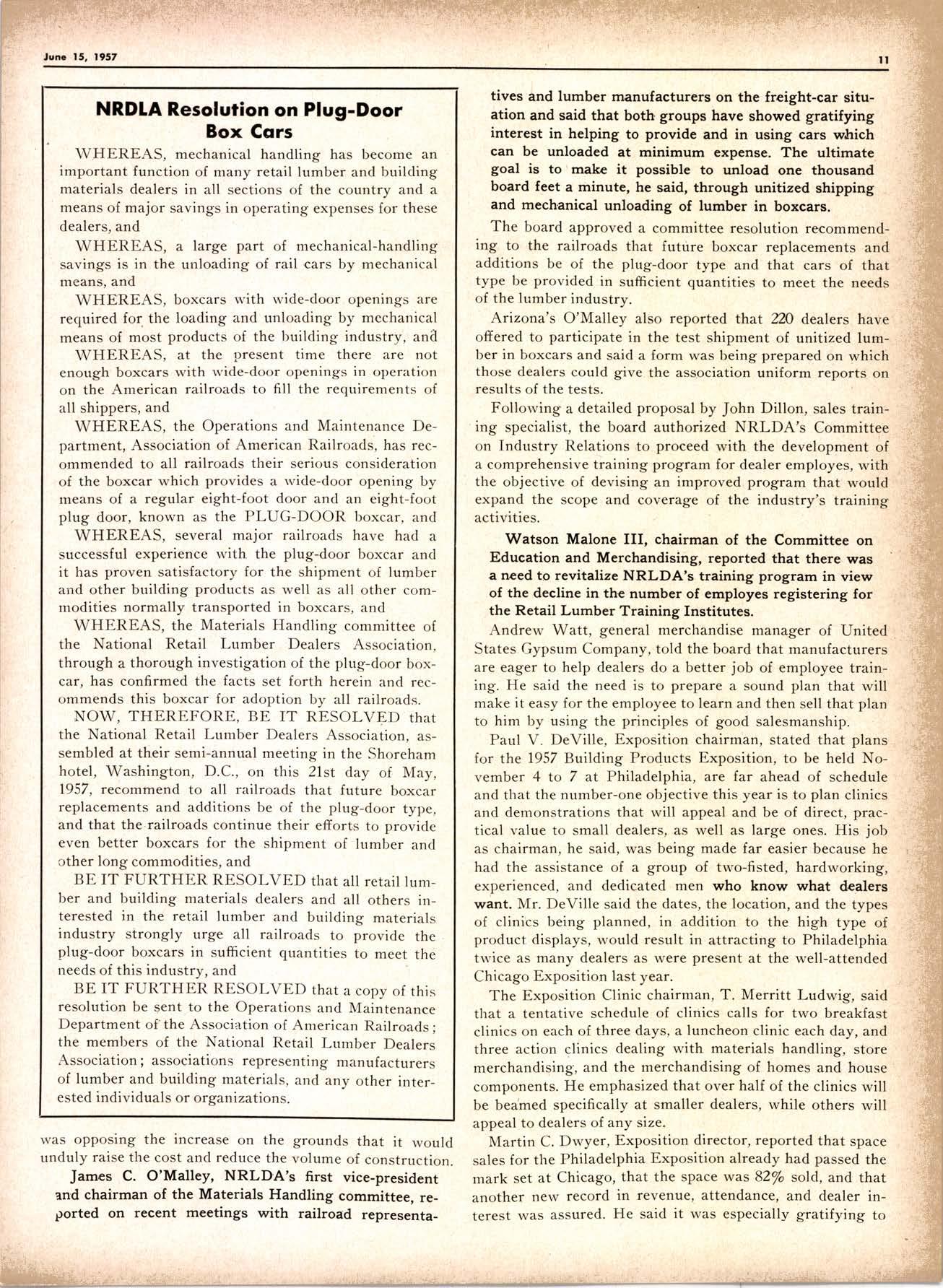
4 minute read
NRDTA Resolution on Plug-Door Box Cqrs
W.HEREAS, mechanical handling has become an important function of many retail lumber and building materials dealers in all sections of the country and a means of major savings in operating expenses for these dealers, and
WHEREAS, a large part of mechanical-handling savings is in the unloading of rail cars by mechanical means, and
WHEREAS, boxcars with wide-door openings are recluired for. the loading and unloading by mechanical means of most products of the building industry, and
WHEREAS, at the present time there are not enough boxcars with lvide-door openings in operation on the American railroads to fill the requirements of all shippers, and
WHEREAS, the Operations and Maintenance Department, Association of American Railroads, has recommended to all railroads their serious consideration of the boxcar which provides a rvide-door opening by rneans of a regular eight-foot door and an eight-foot plug door, known as the PLUG-DOOR boxcar, and
WHEREAS, several major railroads have had a successful experience with the plug-door boxcar and it has proven satisfactory for the shipment of lumber and other building products as well as all other commodities normally transported in boxcars, and
WHEREAS, the Materials Handling committee of the National Retail Lumber Dealers Association, through a thorough investigation of the plug-door boxcar, has confirmed the facts set forth herein and recommends this boxcar for adoption by all railroads.
NOW, THEREFORE, BE IT RESOLVFD that the National Retail Lumber Dealers Association, assembled at their semi-annual meeting in the Shoreham hotel, Washington, D.C., on this 21st day of May, 1957, recommend to all railroads that future boxcar replacements and additions be of the plug-door type, and that the railroads continue their eftorts to provide even better boxcars for the shipment of lumber and other long commodities, and
BE IT FURTHER RESOLVED that all retail lumber and building materials dealers and all others interested in the retail lumber and building materials industry strongly urge all railroads to provide the plug-door boxcars in sufficient quantities to meet the needs of this industry, and w.as opposing the increase on the grounds that it would unduly raise the cost and reduce the volume of construction.
BE IT FURTHER RESOLVED that a copy of this resolution be gent to the Operations and Maintenance Department of'the Association of American Railroads ; the members of the National Retail Lumber Dealers Association; associations representing manufacturers of lumber and building materials, and any other interested individuals or organizations.
James C. O'Malley, NRLDA's first vice-president and chairman of the Materials Handling comrnittee, reported on recent meetings with railroad representa- tives and lumber manufacturers on the freight-car situation and said that both groups have showed gratifying interest in helping to provide and in using cars which can be unloaded at minimum expcnse. The ultimate goal is to make it possible to unload one thousand board feet a minute, hc said, through unitized shipping and mechanical unloading of lumber in boxcars.
The board approved a committee resolution recommending to the railroads that future boxcar replacements and additions be of the plug-door type and that cars of that type be provided in sufficient quantities to meet the needs of the lumber industry.
Arizona's O:Malley also reported that 220 dealers have offered to participate in the test shipment of unitized lumber in boxcars and said a form was being prepared on which those dealers could give the association uniform reportg on results of the tests.
Following a detailed proposal by John Dillon, sales trainr ing specialist, the board authorized NRLDA's Committee on Industry Relations ,to proceed with the development of a comprehensive training program for dealer employes, with the objective of devising an improved program that would expand the scope and coverage of the industry's training activities.
Watson Malone III, chairman of the Committee on Education and Merchandising, reported that there was a need to revitalize NRLDA's training program in view of the decline in the number of employes registering for the Retail Lumber Training Institutes.
Andrew Watt, general merchandise manager of United States Gypsum Company, told the board that manufacturers are eager to help dealers do a better job of employee training. He said the need is to prepare a sound plan that will make it easy for the employee to learn and then sell that plan to him by using the principles of good salesmanship.
Paul V. DeVille, Exposition chairman, stated that plans for the 1957 Building Products Exposition, to be held November 4 to 7 at Philadelphia, are far ahead of schedule and that the number-one objective this year is to plan clinics and demonstrations that will appeal and be of direct, practical value to small dealers, as well as large ones. His job as chairman, he said, was being made far easier because he had the assistance of a group of two-fisted, hardworking, experienced, and dedicated men who know what dcalers want. Mr. DeVille said the dates, the location, and the types of clinics being planned, in addition to the high type of product displays, would result in attracting to Philadelphia twice as many dealers as were present at the well-attended Chicago Exposition last year.
The Exposition Clinic chairman, T. Merritt Ludwig, said that a tentative schedule of clinics calls for two breakfast clinics on each of three days, a luncheon clinic each day, and three action clinics dealing with materials handling, store merchandising, and the merchandising of homes and house components. He emphasized that over half of the clinics will be beamed specifically at smaller dealers, while others will appeal to dealers of any size.
Martin C. Dwyer, Exposition director, reported that space sales for the Philadelphia Exposition already had passed the mark set at Chicago, that the space was B2/o sold, and that another new record in revenue, attendance, and dealer interest was assured. He said it was especially gratifying to









